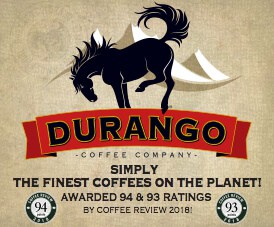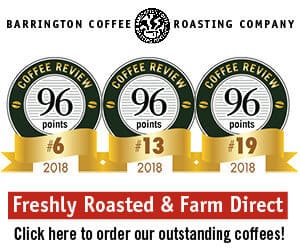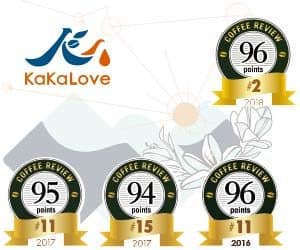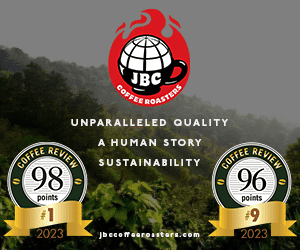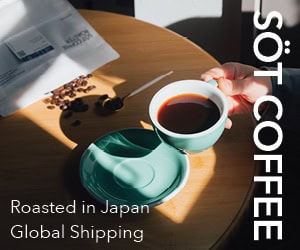Produced by Wilton Benitez of Granja Paraiso 92, entirely of the Orange Bourbon variety of Arabica, and processed by the double-anaerobic thermal shock method, in which the coffee fruit, after having been first sanitized with ozone, undergoes two stages of fermentation. First, the whole cherries are submerged under water for 48 hours, then the beans are pulped and fermented with a strain of
SEARCH RESULTS
Dukunde Kawa Rwanda
Produced by 459 farmers of the Dukunde Kawa Cooperative, entirely of the Bourbon variety of Arabica, and processed at the Mbilima Washing Station by the traditional washed method (fruit skin and pulp removed before drying). Certified FTO. JBC Coffee Roasters’ vision is simple: “Let the coffee lead the way” through sourcing and roasting the best and most unique coffees available and rewarding the
Las Margaritas Geisha Honey
Produced by Rigoberto Herrera of Granja La Esperanza, entirely of the Geisha variety of Arabica, and processed by the honey method, in which some of the fruit flesh is left on the beans during the drying process. JBC Coffee Roasters’ vision is simple: “Let the coffee lead the way” through sourcing and roasting the best and most unique coffees available and rewarding the farmers who grow those
Las Margaritas Sudan Rume Natural
Produced by Rigoberto Herrera of Granja La Esperanza, entirely of the Sudan Rume variety of Arabica, and processed by the natural method (dried in the whole fruit). JBC Coffee Roasters’ vision is simple: “Let the coffee lead the way” through sourcing and roasting the best and most unique coffees available and rewarding the farmers who grow those coffees with substantial premiums. Visit
Wilton Benitez Sidra
Produced by Wilton Benitez of Granja Paraiso 92, entirely of the Sidra variety of Arabica, and processed by the double-anaerobic thermal shock method, in which the coffee fruit, after having been first sanitized with ozone, undergoes two stages of fermentation. First, the whole cherries are submerged under water for 48 hours, then the beans are pulped and fermented with a strain of Lactobacillus
Putra Gayo Sumatra
Produced by smallholding farmers, from trees of the Ateng, Bor Bor, Catimor and Timor varieties of Arabica, and processed at Iwannitosa Putra’s Putra Gayo wet mill by the washed method (fruit skin and pulp removed before drying). JBC Coffee Roasters’ vision is simple: “Let the coffee lead the way” through sourcing and roasting the best and most unique coffees available and rewarding the farmers
Nsoga Iweyza Tanzania Peaberry
Produced by smallholding farmers, from trees of the Kent and N39 varieties of Arabica, and processed by the traditional washed method (fruit skin and pulp removed before drying). This sample consists entirely of peaberries, a kind of bean that results when the coffee fruit develops only a single, oval bean rather than the usual pair of flat-sided beans. JBC Coffee Roasters’ vision is simple: “Let
Yusra Sumatra
Produced by Yusra, from trees of the Ateng, Bor Bor, Catimor and Timor varieties of Arabica, and processed by the traditional washed method (fruit skin and pulp removed before drying). JBC Coffee Roasters’ vision is simple: “Let the coffee lead the way” through sourcing and roasting the best and most unique coffees available and rewarding the farmers who grow those coffees with substantial
La Papaya Pacamara Natural Ecuador
Produced by Juan Peña of Finca La Papaya, entirely of the Typica variety of Arabica, and processed by the natural method with the addition of a yeast-inoculated fermentation step. JBC Coffee Roasters’ vision is simple: “Let the coffee lead the way” through sourcing and roasting the best and most unique coffees available and rewarding the farmers who grow those coffees with substantial premiums.
Palo de Rosa Pink Bourbon Colombia
Produced by 16 smallholding farmers in collaboration with Terra Coffee SASJBC, entirely of the Pink Bourbon variety of Arabica, and processed by the traditional washed method (fruit skin and pulp removed before drying) and adding a second fermentation step (double-washed). Coffee Roasters’ vision is simple: “Let the coffee lead the way” through sourcing and roasting the best and most unique
Ruvumu Natural #13 Burundi
Produced by 251 smallholding farmers of the Murata Commune, entirely of the Bourbon Mayaguez 139 variety of Arabica, and processed by the natural method (dried in the whole fruit) with the addition of a whole-cherry yeast fermentation step. JBC Coffee Roasters’ vision is simple: “Let the coffee lead the way” through sourcing and roasting the best and most unique coffees available and rewarding the
Masha #5 Burundi
Produced by smallholding farmers, entirely if the Bourbon variety of Arabica, and processed by the natural method (dried in the whole fruit) at the Masha Washing Station. JBC Coffee Roasters’ vision is simple: “Let the coffee lead the way” through sourcing and roasting the best and most unique coffees available and rewarding the farmers who grow those coffees with substantial premiums. Visit
Dimtu Ethiopia
Produced by smallholding farmers, from trees of heirloom varieties of Arabica, and processed by the traditional washed method (fruit skin and pulp removed before drying). JBC Coffee Roasters’ vision is simple: “Let the coffee lead the way” through sourcing and roasting the best and most unique coffees available and rewarding the farmers who grow those coffees with substantial premiums. Visit
Buesaco Colombia
Produced by smallholding farmers, from trees of the Caturra, Colombia and Castillo varieties of Arabica, and processed by the traditional washed method (fruit skin and pulp removed before drying). JBC Coffee Roasters’ vision is simple: “Let the coffee lead the way” through sourcing and roasting the best and most unique coffees available and rewarding the farmers who grow those coffees with
Riripa Ethiopia
Produced by smallholding farmers, from local varieties of Arabica (including 74110), and processed by the traditional washed method (fruit skin and pulp removed before drying). JBC Coffee Roasters’ vision is simple: “Let the coffee lead the way” through sourcing and roasting the best and most unique coffees available and rewarding the farmers who grow those coffees with substantial premiums. Visit
Murundo People’s Farm Rwanda (Espresso)
Produced by smallholding farmers around the Murundo Washing Station, entirely of the Bourbon variety of Arabica, and processed by the traditional washed method (fruit skin and pulp removed before drying). JBC Coffee Roasters’ vision is simple: “Let the coffee lead the way” through sourcing and roasting the best and most unique coffees available and rewarding the farmers who grow those coffees with
Murundo People’s Farm Rwanda
Produced by smallholding farmers around the Murundo Washing Station, entirely of the Bourbon variety of Arabica, and processed by the traditional washed method (fruit skin and pulp removed before drying). JBC Coffee Roasters’ vision is simple: “Let the coffee lead the way” through sourcing and roasting the best and most unique coffees available and rewarding the farmers who grow those coffees with
Yaye Chericho Ethiopia Espresso
Produced by smallholding farmers and processed by Faysel Abdosh, from trees of the 774110 and 74158 varieties of Arabica, and processed by the washed method (fruit skin and pulp removed before drying) and an extended 72-hour fermentation period. JBC Coffee Roasters’ vision is simple: “Let the coffee lead the way” through sourcing and roasting the best and most unique coffees available and
Putra Gayo Sumatra Espresso
Produced by smallholding farmers, from trees of the Ateng, Bor Bor, Catimor and Timor varieties of Arabica, and processed at Iwannitosa Putra’s Putra Gayo wet mill by the washed method (fruit skin and pulp removed before drying). JBC Coffee Roasters’ vision is simple: “Let the coffee lead the way” through sourcing and roasting the best and most unique coffees available and rewarding the farmers
Putra Gayo Sumatra
Produced by smallholding farmers, from trees of the Ateng, Bor Bor, Catimor and Timor varieties of Arabica, and processed at Iwannitosa Putra’s Putra Gayo wet mill by the washed method (fruit skin and pulp removed before drying). JBC Coffee Roasters’ vision is simple: “Let the coffee lead the way” through sourcing and roasting the best and most unique coffees available and rewarding the farmers


